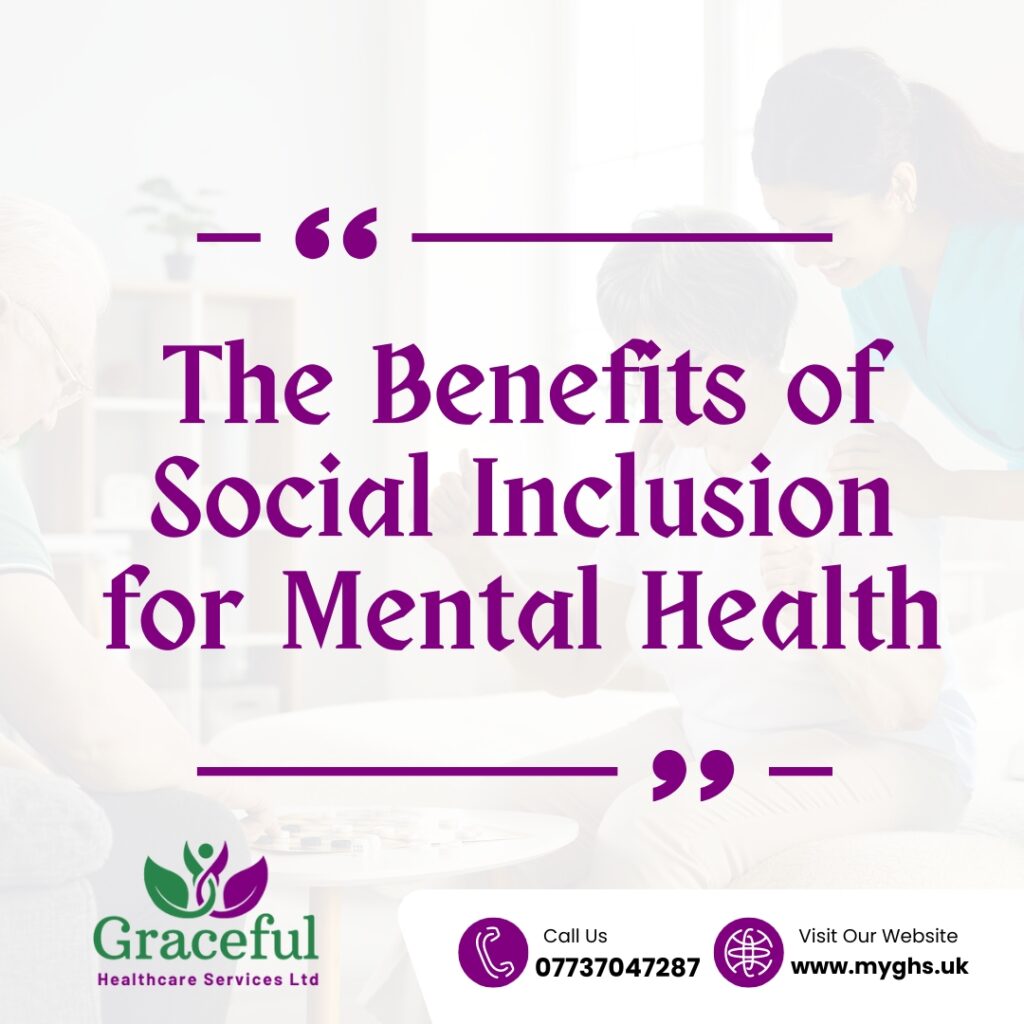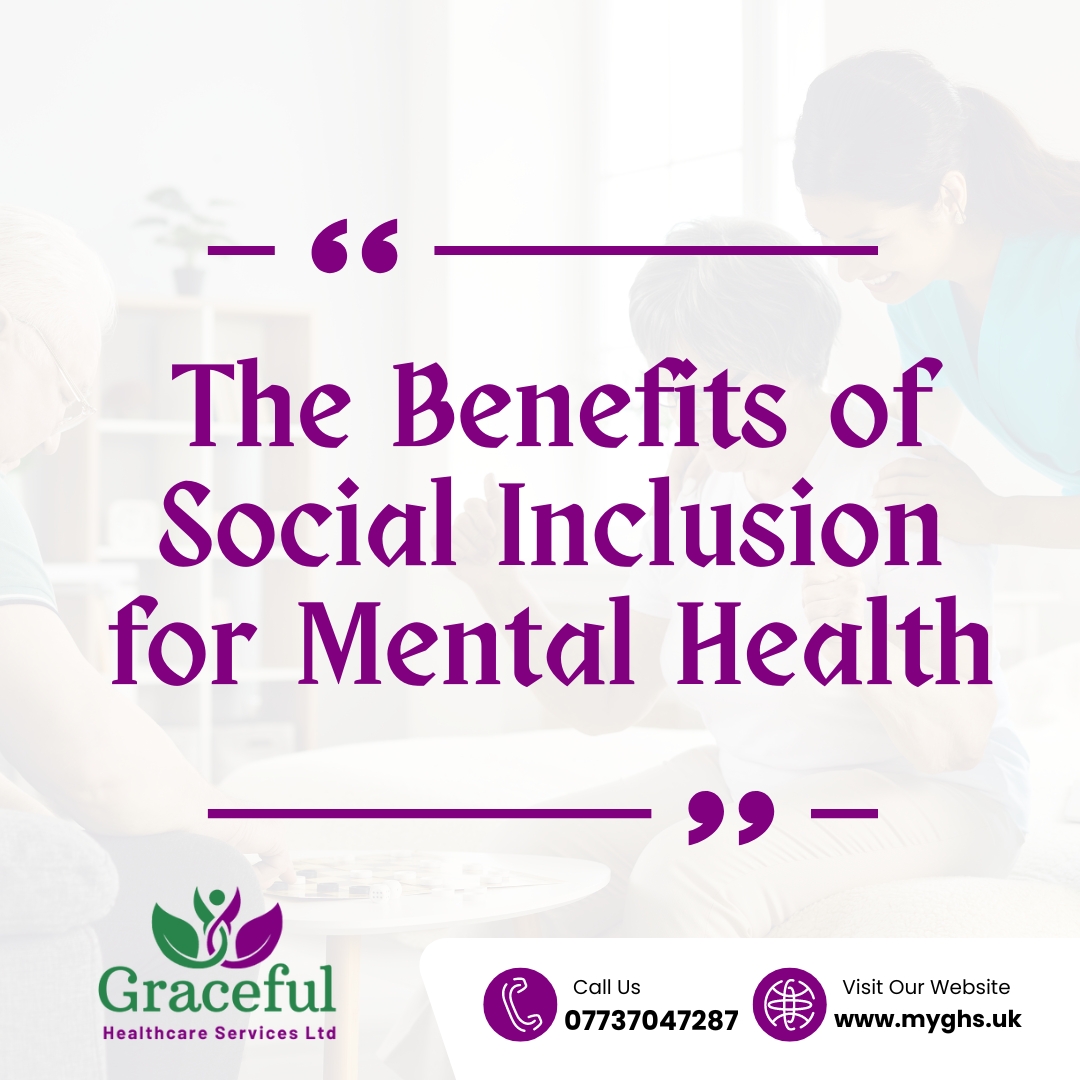The Benefits of Social Inclusion for Mental Health

Table of Contents
- The Benefits of Social Inclusion for Mental Health
- Understanding Social Inclusion in Healthcare
- The Link Between Social Inclusion and Mental Health
- The Role of Community-Based Healthcare in Promoting Social Inclusion
- The Mental Health Benefits of Social Inclusion Care
- Case Studies: The Impact of Social Inclusion on Mental Health
- The Economic Impact of Social Inclusion on Mental Health
- The Future of Social Inclusion in Mental Health Care
- Choosing the Right Social Inclusion Care Service
- Conclusion: Embracing Social Inclusion for Better Mental Health
Mental health is an integral part of our overall well-being, yet it often does not receive the attention it deserves. In recent years, the focus has shifted towards understanding the broader determinants of mental health, and one factor that has emerged as particularly important is social inclusion. The concept of social inclusion, especially within the realm of community-based healthcare, has proven to have significant benefits for mental health. For individuals seeking support, Graceful Healthcare Services offers an array of services designed to enhance social inclusion and, by extension, improve mental well-being.
Understanding Social Inclusion in Healthcare
Social inclusion refers to the process of improving the terms of participation in society, particularly for people who are disadvantaged due to age, disability, poverty, or other factors. In the context of healthcare, social inclusion care focuses on integrating individuals into their communities, ensuring they have access to resources, opportunities, and social networks that can positively influence their mental health.
In the UK, the importance of social inclusion in healthcare has been increasingly recognised. The National Institute for Health and Care Excellence (NICE) emphasises that promoting social inclusion can significantly enhance the mental health outcomes of individuals, particularly those at risk of social isolation and exclusion. This has led to a shift towards community-based healthcare models that prioritise social inclusion as a key element of care.
The Link Between Social Inclusion and Mental Health

The relationship between social inclusion and mental health is well-documented. Numerous studies have shown that social inclusion can lead to better mental health outcomes, reducing the risk of mental health conditions such as depression, anxiety, and stress.
- Reduced Social Isolation: Social inclusion initiatives aim to connect individuals with their communities, reducing the sense of isolation that can lead to mental health issues. According to the Mental Health Foundation, social isolation is a significant risk factor for mental health problems, with research indicating that loneliness can increase the likelihood of depression by up to 40%.
- Increased Self-Esteem and Confidence: Being part of a supportive community helps individuals feel valued and respected, which can boost self-esteem and confidence. This, in turn, can lead to improved mental health. A report by the Centre for Mental Health highlights that people who experience social inclusion tend to have higher self-esteem, which is directly linked to better mental health outcomes.
- Access to Resources and Support: Social inclusion ensures that individuals have access to the resources and support they need to maintain their mental health. This can include access to healthcare services, employment opportunities, and social networks that provide emotional and practical support. The NHS has acknowledged that community-based healthcare models that focus on social inclusion can lead to more sustainable mental health outcomes, as they address the root causes of mental health issues rather than just the symptoms.
The Role of Community-Based Healthcare in Promoting Social Inclusion
Community-based healthcare is central to promoting social inclusion, particularly for individuals who may be at risk of social exclusion due to factors such as age, disability, or mental health conditions. This approach to healthcare focuses on integrating individuals into their communities and providing them with the support they need to participate fully in society.
In the UK, community-based healthcare services have been increasingly adopted as a way to address the complex needs of individuals who require social inclusion care. These services are designed to be accessible, flexible, and tailored to the specific needs of each individual, ensuring that they receive the support they need to improve their mental health.
One of the key benefits of community-based healthcare is that it allows for a more holistic approach to mental health care. Rather than focusing solely on medical treatment, community-based services consider the social determinants of health, such as housing, employment, and social connections. This approach recognises that mental health is influenced by a range of factors and that addressing these factors can lead to better mental health outcomes.
For example, Graceful Healthcare Services provides community-based healthcare that emphasises social inclusion. Their services are designed to help individuals build social connections, access resources, and participate in their communities, all of which are crucial for improving mental health. By offering personalised care plans that focus on the unique needs of each individual, Graceful Healthcare Services ensures that their clients receive the support they need to achieve better mental health and overall well-being.
The Mental Health Benefits of Social Inclusion Care

The mental health benefits of social inclusion care are numerous and far-reaching. Here are some of the key ways in which social inclusion can improve mental health:
- Enhanced Coping Mechanisms: Social inclusion provides individuals with a support network that can help them cope with life’s challenges. When people feel connected to their communities, they are more likely to seek help and support when they need it. This can lead to better coping mechanisms and a reduced risk of developing mental health problems. Research from the National Institute of Health indicates that social support is one of the most important factors in protecting mental health and promoting resilience.
2. Reduction in Stress and Anxiety: Social inclusion can help to reduce stress and anxiety by providing individuals with a sense of belonging and security. When people feel included and supported, they are less likely to experience the chronic stress that can lead to mental health issues. A study published in the Journal of Anxiety Disorders found that individuals with strong social connections had lower levels of anxiety and were more resilient to stress.
3. Improved Quality of Life: Social inclusion can significantly improve an individual’s quality of life. By fostering connections and providing access to resources, social inclusion care can help individuals lead more fulfilling and satisfying lives. The Mental Health Foundation notes that individuals who experience social inclusion tend to have a higher quality of life, with better mental health outcomes and greater overall well-being.
Case Studies: The Impact of Social Inclusion on Mental Health
To illustrate the impact of social inclusion care on mental health, let’s consider a few examples:
Case Study 1: Elderly Isolation and Social Inclusion
An elderly woman living alone in Birmingham was experiencing severe depression due to social isolation. She had little contact with family or friends and was struggling to maintain her independence. After being referred to a community-based healthcare service, she began participating in social activities and receiving regular visits from a support worker. Over time, her mood improved, and she reported feeling more connected and supported. Her depression symptoms decreased, and she was able to regain her independence and enjoy a better quality of life.
This case demonstrates how social inclusion care can significantly impact mental health, particularly for individuals at risk of social isolation.
Case Study 2: Mental Health Recovery through Community Support
A middle-aged man recovering from a mental health crisis was struggling to reintegrate into society. He felt isolated and unsupported, which was hindering his recovery. Through a social inclusion programme offered by a community-based healthcare service, he was able to connect with others who had similar experiences, participate in support groups, and access resources that helped him rebuild his life. As a result, he experienced a significant improvement in his mental health and was able to return to work and lead a fulfilling life.
This example highlights the importance of social inclusion in mental health recovery and the role of community-based healthcare in supporting individuals on their recovery journey.
The Economic Impact of Social Inclusion on Mental Health
In addition to the personal benefits, social inclusion also has significant economic implications. Mental health problems are a leading cause of disability and unemployment in the UK, costing the economy an estimated £105 billion each year in healthcare, lost productivity, and welfare benefits. By promoting social inclusion, we can reduce the economic burden of mental health problems and improve the overall well-being of society.
- Reduced Healthcare Costs: Social inclusion care can help to reduce the demand for mental health services by preventing the onset of mental health problems and promoting recovery. A report by the London School of Economics (LSE) found that investing in social inclusion initiatives could lead to significant cost savings for the NHS by reducing the need for more intensive mental health services.
- Increased Employment and Productivity: Social inclusion can also lead to increased employment and productivity by helping individuals with mental health problems to remain in work or return to work. The Mental Health Foundation estimates that improving social inclusion could lead to a 4% increase in the employment rate among people with mental health problems, resulting in a significant boost to the economy.
- Improved Community Well-being: Finally, social inclusion care can enhance the overall well-being of communities by fostering social cohesion and reducing inequalities. This can lead to healthier, more resilient communities that are better equipped to support their members and promote mental health.
The Future of Social Inclusion in Mental Health Care

As the importance of social inclusion for mental health becomes increasingly recognised, there are several trends and developments that could shape the future of social inclusion care in the UK:
- Integration with Digital Health Technologies: The integration of digital health technologies into social inclusion care is likely to play a significant role in the future. Telehealth services, online support groups, and digital tools that connect individuals with their communities can help to enhance social inclusion and improve mental health outcomes. For example, digital platforms that facilitate social connections and provide access to resources can help individuals overcome barriers to social inclusion, such as mobility issues or geographical isolation.
- Expansion of Community-Based Healthcare Services: The expansion of community-based healthcare services that focus on social inclusion is another key trend. As more healthcare providers recognise the benefits of social inclusion for mental health, we can expect to see an increase in the availability and accessibility of these services. Graceful Healthcare Services is an example of a provider that is leading the way in offering personalised, community-based care that prioritises social inclusion.
- Policy Support and Investment: Finally, policy support and investment in social inclusion care will be crucial for its future development. Government initiatives that promote social inclusion and provide funding for community-based healthcare services can help to ensure that more individuals have access to the support they need to improve their mental health.
Choosing the Right Social Inclusion Care Service
For individuals seeking social inclusion care, choosing the right service is essential to achieving the best mental health outcomes. When evaluating social inclusion care services, consider the following factors:
- Personalisation of Care: Look for services that offer personalised care plans tailored to your unique needs and preferences. This is particularly important for individuals with complex or long-term mental health conditions that require specialised support.
- Community Integration: Choose a service that focuses on community integration and provides opportunities for social participation. This can include access to social activities, support groups, and community resources.
- Multi-Disciplinary Support: Ensure that the service offers multi-disciplinary support, including access to mental health professionals, social workers, and peer support. This can provide a more comprehensive approach to mental health care.
- Reputation and Reviews: Research the service’s reputation by reading reviews and testimonials from previous clients. This can provide valuable insights into the quality of care and the experiences of others who have used the service.
For those in need of social inclusion care, Graceful Healthcare Services offers a range of personalised, community-based healthcare services designed to support mental health and well-being. With a focus on social inclusion and a commitment to providing high-quality care, Graceful Healthcare Services is a trusted provider that can help individuals achieve better mental health and a higher quality of life.
Conclusion: Embracing Social Inclusion for Better Mental Health

Social inclusion is a powerful tool for improving mental health and enhancing the quality of life. By fostering connections, providing access to resources, and promoting participation in society, social inclusion care can lead to better mental health outcomes and a more fulfilling life.
In the UK, the importance of social inclusion for mental health is increasingly recognised, with community-based healthcare services playing a central role in promoting social inclusion. By choosing the right social inclusion care service, individuals can access the support they need to improve their mental health and achieve their full potential.
For those seeking to enhance their mental health through social inclusion, Graceful Healthcare Services offers a range of services designed to support individuals on their journey to better mental health. With personalised care plans, community integration, and multi-disciplinary support, Graceful Healthcare Services can help individuals achieve the mental health benefits of social inclusion and lead a more fulfilling life.
Disclaimer: This article is intended for informational purposes only and does not constitute medical advice or professional care recommendations. The information provided is based on current research and best practices at the time of writing. Readers should consult with healthcare professionals, qualified care providers, or local authorities before making decisions about social inclusion care or any other form of senior care. While efforts have been made to ensure accuracy, Graceful Healthcare Services Ltd and the author do not guarantee the completeness or currency of the information presented. Individual circumstances may vary, and personalised advice should always be sought.
References
- Mental Health Foundation. (2021). Loneliness and mental health. Available from: https://www.mentalhealth.org.uk/
- Centre for Mental Health. (2019). Social inclusion and mental health. Available from: https://www.centreformentalhealth.org.uk/
- National Institute of Health. (2017). The correlation of social support with mental health: A meta-analysis. Available from: https://www.ncbi.nlm.nih.gov/pmc/articles/PMC5633215/
- The National Institute for Health and Care Excellence (NICE) (2016) Available from: https://www.nice.org.uk/guidance/qs137/chapter/quality-statement-3-social-participation
- London School of Economics. (2016). The economic case for social inclusion. Available from: https://www.lse.ac.uk/






Leave a Reply